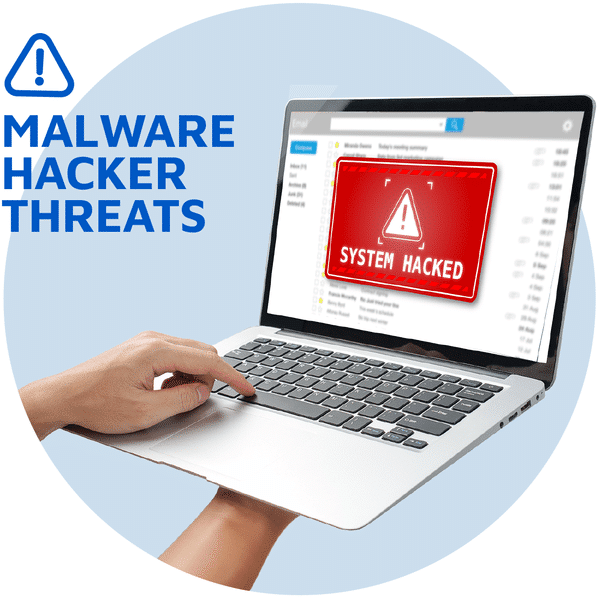Defend Against
Zero-Day Threats
Key Insights on Zero-Day Attacks: Risks for MSPs and SMBs
How Zero-Day Attacks Work
Zero-day attacks, sometimes written as 0-day attacks, are orchestrated maneuvers by cybercriminals, exploiting undisclosed vulnerabilities in software or systems.
Zero-day attacks typically involve a series of steps, starting with a malicious actor discovering a vulnerability.
This individual or group then exploits the vulnerability to breach a system’s security, often deploying malware to cause chaos or steal sensitive data.
The absence of a known fix for the vulnerability increases the complexity and urgency of such attacks, making them a severe and powerful threat.

Zero-Day Attacks Consequences
Direct Financial Costs
Recovering from a zero-day attack involves significant expenditures.
These costs range from forensic analysis and system rebuilding to potential ransoms demanded during ransomware attacks.
Organizations may also face increased insurance premiums and heightened security investments to prevent future incidents.
Data Theft and Reputational Damage
The repercussions of a breach, from data theft to reputational damage, are profound and far-reaching.
Zero-day attacks can lead to loss of customer trust, contractual penalties, legal actions, fines, and even criminal charges against company executives.
The long-term financial impact of losing customers and the cost of rebuilding a damaged reputation are often extensive.
Business Continuity Disruption
The sudden onslaught of zero-day exploits severely disrupts business continuity, leading to a cascade of disadvantages and losses for organizations. The most immediate effect is the downtime of critical systems, which can halt production or service delivery.
Due to the interconnectivity of modern businesses, these attacks can extend beyond the initially affected system, impacting entire supply chains and causing widespread operational disruptions.
This ripple effect necessitates a swift and coordinated response to minimize long-term damage.
Insights from Zero-Day Attack
Case Studies
Recent incidents of zero-day attacks highlight the continuous and sophisticated threats posed by cybercriminals.
The 2021 Microsoft Exchange Server vulnerabilities, exploited by the HAFNIUM group, led to extensive organizational breaches worldwide. These attackers gained unauthorized access to email accounts and extracted sensitive data, illustrating the devastating impact of zero-day exploits.
Another significant incident, the Log4Shell vulnerability discovered in December 2021, jeopardized a myriad of applications and systems globally. Cybercriminals exploited this flaw for remote code execution attacks, showcasing the broad and severe risks associated with zero-day vulnerabilities.
These case studies stress the urgent need for vigilant security measures and robust incident response strategies to mitigate potential damages from such exploits.
(Sources: Microsoft Security Response Center, CISA, ZDNet)

Best Practices for Zero-Day Exploit Protection
Given the ongoing risk posed by zero-day vulnerabilities, traditional security measures alone may not suffice.
Effective zero-day exploit protection requires a proactive approach and a comprehensive understanding of detection techniques and defense strategies.
Zero-Day Exploit Detection Techniques
Detection of zero-day exploits requires advanced techniques capable of identifying suspicious behavior and anomalies indicative of potential attacks.
Behavioral analysis, anomaly detection, and heuristic scanning are essential components of effective detection strategies.
By monitoring network traffic, system logs, and application behavior in real-time, organizations can quickly identify and mitigate zero-day exploits before they inflict substantial damage.
Leveraging threat intelligence feeds and collaborating with cybersecurity experts can further enhance detection capabilities, enabling proactive defense against emerging threats.

Implementing Zero-Day Defense Strategies
- Software Updates: Regular patching closes security gaps preemptively.
- Network Segmentation: Isolating network segments contains breaches effectively.
- Least Privilege Access: Minimizing access rights mitigates potential damages.
- Application Whitelisting: Restricting software execution to approved applications enhances security.
- Employee Training: Continual security awareness training strengthens frontline defenses.

Strategies for Zero-Day Attack Protection and Zero-Day Virus Attack Prevention
Proactively defending against zero-day attacks and preventing zero-day virus outbreaks is essential for safeguarding the security and integrity of organizations of all sizes.
Implementing effective strategies is crucial to protect against these unpredictable threats, which can compromise critical data and disrupt business operations.
Detecting and Mitigating
Zero-Day Virus Attacks
Vircom’s security solutions employ cutting-edge technologies such as behavioral analysis, machine learning algorithms, and real-time monitoring to identify and neutralize zero-day virus attacks proactively.
By analyzing file behavior, network traffic, and system activities, our security solutions can rapidly identify anomalous patterns indicative of zero-day attacks and respond with precision to neutralize the threat before it can wreak havoc on your organization’s systems and data.

The Role of Advanced Security
in Best Zero Day Protection
- Robust email security
- Network intrusion prevention
- Endpoint protection
- Threat intelligence feeds to enhance your security

ROBUST PROTECTION BUNDLES
Protect your business
with Vircom's comprehensive security bundles.
The Critical Role of Zero-Day Attack Protection in Cybersecurity
Defending against zero-day attacks is crucial, transcending typical cybersecurity measures to become a fundamental investment in an organization’s resilience and continuity of operations.
This level of protection is vital as zero-day attacks can exploit unknown vulnerabilities, potentially causing severe damage before defensive measures can be updated. Effective zero-day protection strategies fortify a company’s defenses against these unforeseen threats, thereby maintaining operational integrity and securing critical data assets.
Selecting the Right Zero-Day Protection Solution
Comprehensive coverage across multiple vectors
Zero-day threats can come from different entry points - clicking on a phishing email, downloading from an infected site, or a network breach. A robust zero-day protection solution should cover all these areas comprehensively. Ensure you have solutions that protect various attack vectors, including email, network, and endpoints.
Advanced detection capabilities
Invest in advanced detection capabilities that track known threats and employ tools like behavioral analysis, machine learning, and threat intelligence to proactively identify and mitigate zero-day threats. These technologies enable organizations to detect unusual patterns and quickly identify and mitigate potential zero-day threats.
Real-time response systems
The period between a zero-day exploit and its detection is brief, posing high risks. Choose a solution that provides real-time response capabilities to quickly neutralize zero-day attacks and prevent their spread across the network.
Scalability and flexibility
As your business grows and evolves, so should your security solutions. Select a system that scales with your company, adapts to emerging threats, and integrates with new security technologies. If you are an MSP or serve multiple departments or customers, consider whether the solution supports multi-tenancy.
Integration with existing security infrastructure
Ensure your zero-day protection solution integrates seamlessly with your existing security infrastructure, including firewalls, SIEM systems, and endpoint security tools. This compatibility enhances effectiveness and simplifies management, creating a cohesive security posture.
User-friendliness and Manageability
The effectiveness of a security solution also depends on how easy it is for your team to implement, manage, and use on a daily basis. Choose solutions that offer a user-friendly interface and straightforward management tools. This ensures that your IT staff can efficiently monitor threats, implement updates, and adjust settings without extensive training.
Zero-Day Attack Protection
for Businesses

“Vircom’s solutions are an integral component of our cybersecurity defense. Their continued product enhancements and overall effectiveness combined with staff sense of urgency and follow up are one of the reasons Vircom is one of our longest running partners.”
Explore advanced methods for strengthening your email defense framework.

